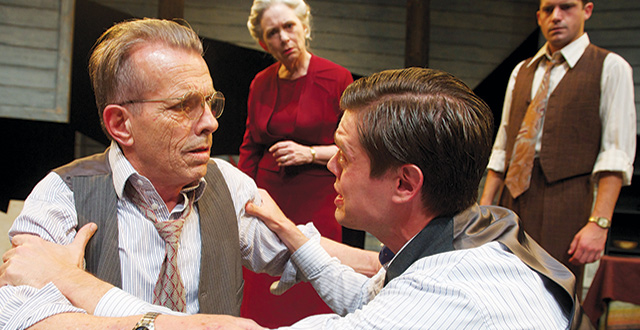Arthur Miller’s 1949 play Death of a Salesman is widely recognized as a masterpiece, its everyman antihero Willy Loman one of the most famous characters in theater. Taking on such a renowned work—the Pulitzer-winning staple of many an English class curriculum—could prove risky, but San Jose Stage Company‘s production shows there’s life in this classic drama yet.
Death of a Salesman is a distinctly American tragedy—the dark side of the American dream. Willy (Randall King) is a traveling salesman who’s worked for 36 years to provide for his devoted wife Linda (Lucinda Hitchcock Cone) and their two sons, Biff (Danny Jones) and Happy (Jeffrey Brian Adams), now grown. On the surface, the Lomans give the appearance of a decent middle-class family, with a Brooklyn home and 25-year mortgage one bill away from being paid off. But in reality, they’re a disaster.
Willy’s commission is dwindling as he pathetically clings to the job that’s meant so much to him. As he nears what should be retirement age, his mental health is in obvious and serious decline. Firstborn Biff was once the golden boy and apple of his father’s eye—high-school football star, university-bound, destined for big things—but he and Willy fell out long ago, and a series of questionable decisions have left Biff adrift and shiftless. Younger son Happy worshipped both his dad and elder brother as he grew up in their shadows. In adulthood, he has inherited Willy’s desperate need to keep up appearances. Underneath his cheerful veneer he’s a habitual, insecure liar, forever seeking his parents’ approval and attention, which they will never be able to give, having spent it all on Biff.
Steadfast Linda sees through Willy’s bluster and bombast and loves him fiercely despite it. She accepts him, dreamy, delusional nature and all, and defends him to her sons—rebuffing their love for her while doing all she can to protect her increasingly unhinged husband’s fragile emotional state. Joining the nuclear Loman family are memorable supporting characters, including Willy’s idol, his long-absent elder brother Ben (Kevin Blackton), whose pioneering spirit and self-made fortune represent the pinnacle of American manhood and success. Best frenemy Charley (Michael Bellino) and his studious son Bernard (Joey Pisacane) are good-hearted thorns in Willy’s side.
Willy’s an average, “small” man who yearns for greatness and genuinely believes it’s within his grasp. As he loses touch with reality and re-lives old memories, the audience witnesses flashbacks that explain how the Lomans have ended up in their current state. It’s clear that Death of a Salesman has been a major influence on many later works, including television’s Mad Men, and it’s terrific to experience the source material anew, still fresh and resonant after so many years.
“Attention must be paid,” as Linda would say, to Miller’s distinctive and almost-musical writing. His repetition of key lines, unremarkable by themselves but imbued with meaning in context, give the play a rhythm and thoughtfulness that shows why he’s one of the masters.
“Salesman” must be one of the most quotable of plays, with so many heartbreaking, exquisite turns of phrase (“He’s liked but he’s not well-liked”) including my favorite, in which Willy admits to feeling “kind of temporary” about himself at the moment.
King, also the company’s artistic director and co-founder, is riveting as Willy, in what must be a jewel of a role in any veteran actor’s crown. Jones is appealingly vulnerable as Biff, the family disappointment who actually sees himself and the others clearly and honestly. Adams is excellent as pathetically eager Happy, and Cone handles with aplomb the tricky role of Linda, who’s willing to act like Willy’s doormat while serving as his tower of strength. Will Springhorn, Jr., and Brandon Leland are standouts in their small roles as Willy’s unintentionally cruel young boss and a sweet and funny waiter, respectively. And Blackton’s deep-voiced, regal Ben commands every surreal scene he appears in.
San Jose Stage Company does a beautiful job with the material, using simple backdrop-projection changes as set design and implementing quick costume and hair-color switches to separate flashback from present. Somber background music by Cliff Caruthers helps set the tone. Though set in the mid-twentieth century, which suits the beatnik, old-fashioned sound of the dialogue, Death of a Salesman is easily still applicable to current-day America, and San Jose Stage Company’s production earned every clap of the standing ovation it received at the performance I attended. And for everyone who did read the play in high school, experiencing it live is, in Willy’s words, “a remarkable thing.”
Death of a Salesman
April 1-26, $42-$60
San Jose Stage Company

 Kotetsu Ramen Holds its Own in the Battle for Noodle Supremacy
Kotetsu Ramen Holds its Own in the Battle for Noodle Supremacy  San Jose Jazz Summer Fest Lineup Brings Jazz Diaspora to San Jose
San Jose Jazz Summer Fest Lineup Brings Jazz Diaspora to San Jose 


